Nurturing healthy eating habits in children from a young age is crucial for fostering a generation that values well-being. In a preschool setting, a food and nutrition theme can be an exciting way to introduce healthy eating. So, try out these healthy eating activities for preschoolers!
This blog post offers a guide for teachers to bring nutrition to life with this fun preschool theme through various activities.
We’ll explore creative methods to instill the importance of a balanced diet, and transform the way young learners perceive healthy food, and discover the foods that fill out bodies with the nutrition it needs for learning and playing.
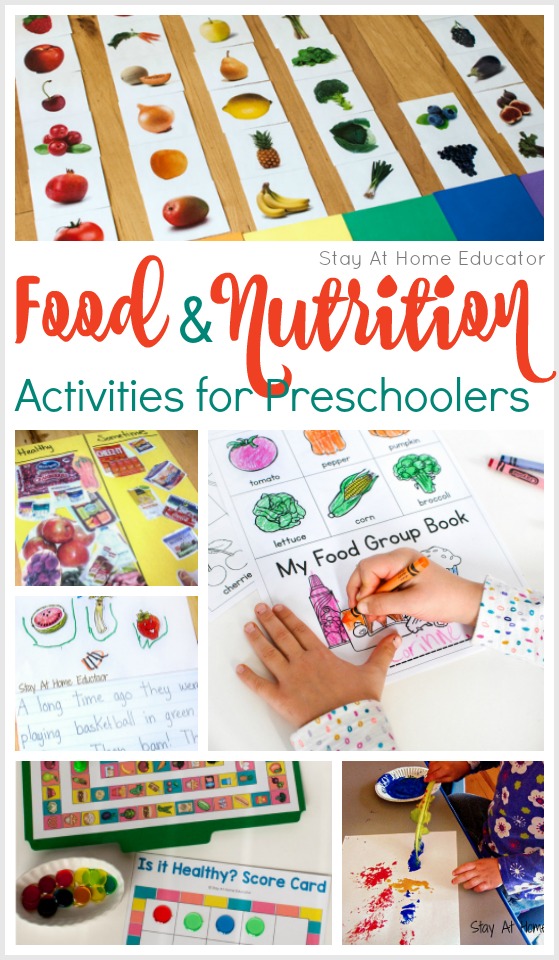
Establishing a solid foundation of healthy eating habits from the get-go is paramount in a child’s life, as this fortifies their relationship with food and nutrition throughout their lifetime. Incorporating a food and nutrition theme in a preschool curriculum is a significant step in the right direction.
Within this unit, children will learn about food groups, and how they contribute to providing the nutrition our bodies need to learn and play.
How to Teach Healthy and Unhealthy Food
Instead of labeling foods as “junk foods” rephrase them to something like “sometimes” foods. Sometimes foods are those we have in moderation because they are less nutrient dense.
It is also important to teach preschoolers about portion sizes when considering different food groups. Sometimes foods should have smaller portions because they simply don’t fuel our bodies and minds as effectively, while vegetables can be unlimited.
Additionally, it’s important not to put too much emphasis on the value of sometimes foods.
For example, it is no longer best practice to “finish your plate” before enjoying a small candy at lunch time. Instead, offer the candy with lunch so your preschooler doesn’t become conditioned to thinking that sweets have a greater value than other foods.
How Do You Explain Healthy Eating to Preschoolers?
Healthy eating is eating the foods that provide proper nutrition is important because nutrients fuel our bodies and enable us to do all our favorite things, which is important to explain to our preschoolers.
It’s astonishing that nearly 25% of children ages 2-5 are obese or overweight! While teaching about food and nutrition in preschool, it’s important not to refer to foods being “good” or “bad” for you. We don’t want children to feel bad for their choices.
Explain the food pyramid to your preschoolers and help them understand that each food group is important because eat group has special nutrients that not only help us grow big and strong but these nutrients also help us think and grow smarter.
Picture Books for Food & Nutrition Theme
There are so many great children’s books that teach kids about healthy eating. Here are some of our favorite food and nutrition theme books just right for preschoolers.
These books became an integral part of our food and nutrition preschool theme as they were such a great segue into so many of our activities. Reading books with children also encourages children to talk about food and healthy choices, both of which are an important part of the learning process.
Books for Adults About Teaching Healthy Eating Habits
If you’re really interested in the nitty gritty about how to eliminate a picky eater, these books are fantastic.
Healthy Eating Activities for Preschoolers
These food and nutrition activities for preschoolers are sure to fill your preschool nutrition theme with all the best activities, including healthy food activities for toddlers, too.
Fruit and Vegetable Color Sort
Use these fruit and vegetable cards from Montessori for Everyone to conduct a color sorting activity with your students.
Lay out color-coded foam pieces on the floor, corresponding to the colors of various fruits and vegetables, even including white and tan. Distribute the cards to students one by one for sorting.
This activity not only serves as an introduction but also helps students familiarize themselves with different kinds of fruits and vegetables, such as figs, pomegranates, and guavas, which may be rare or expensive in our area.
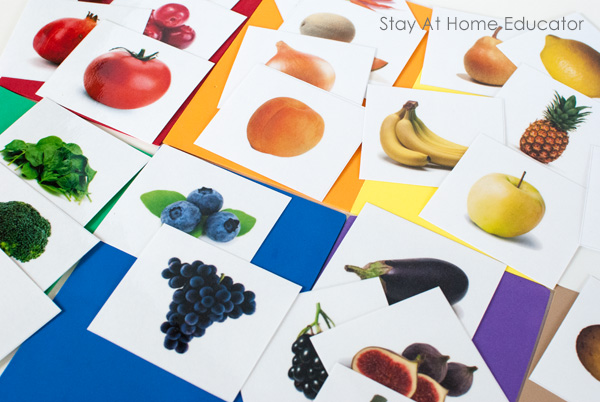
After sorting, we used the exact same materials to graph the pictures by their colors! The students discovered we tend to eat more foods of one color over others.
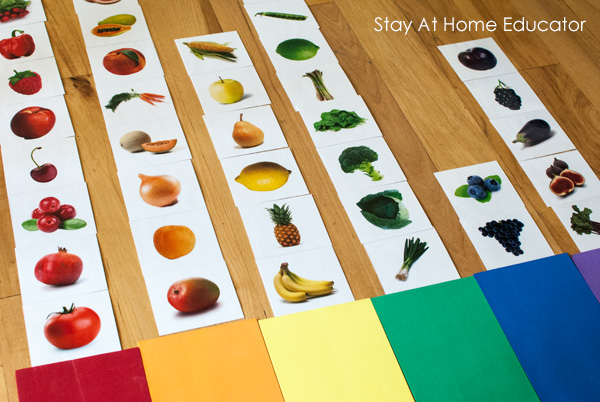
Eat The Rainbow Color Organization
The sorting activity based on color naturally segued into the importance of consuming fruits and vegetables for our health. These nutrient-rich foods fortify us, enhance our agility, and sharpen our cognitive abilities – qualities that every young child aspires to possess.
I encouraged the children to categorize the cards by their colors, resulting in a vibrant rainbow. Once our colorful spectrum was assembled, I explained the significance of eating a variety of colorful foods daily, like in our Eat the Rainbow Printable.
Finally, each student was asked to choose an array of food items from this rainbow, symbolizing their daily consumption. The objective was to ensure every child selected foods of diverse colors.
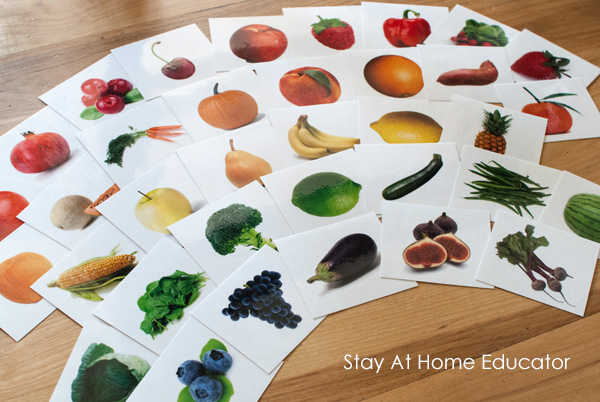
Food Group Sort Book – Free Printable
The above activity naturally led us to this next one. This food group book made it fun for the preschoolers to think about what they love to eat and how they fit into eating the rainbow.
Honestly, though, I didn’t spend a lot of time discussing the nutrition of each food group. I spent more time on helping the students identify which foods fit into each group.
The directions are super simple.
- Cut two sheets of construction paper in half lengthwise. Fold in half and staple to make a booklet.
- Color the food pictures and cut them apart.
- Glue into the booklet.
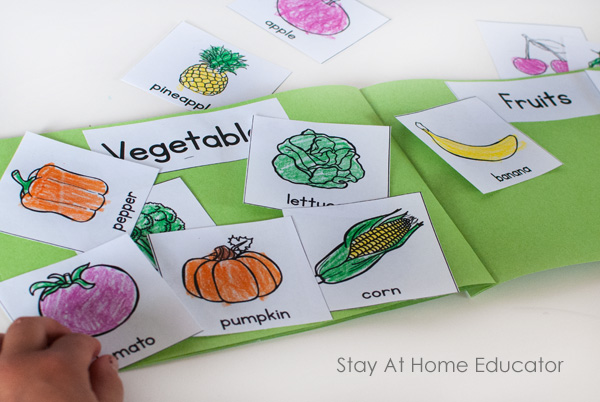
Get Your Free Food Group Sorting Booklet
Fruit and Vegetable Printmaking Art
Students explored some common fruits and vegetables by doing some printmaking. I began by showing the whole food and asking the students to name them.
Then, I carefully sliced each one and the students thought it was so cool to look at the insides. We briefly discussed what we saw (but you could absolutely expand that into a full-blown food science center).
Then we got right to work doing some printmaking. We used celery, apples, mushrooms, onions, and bell peppers. I love the onions because each ring can be seen.
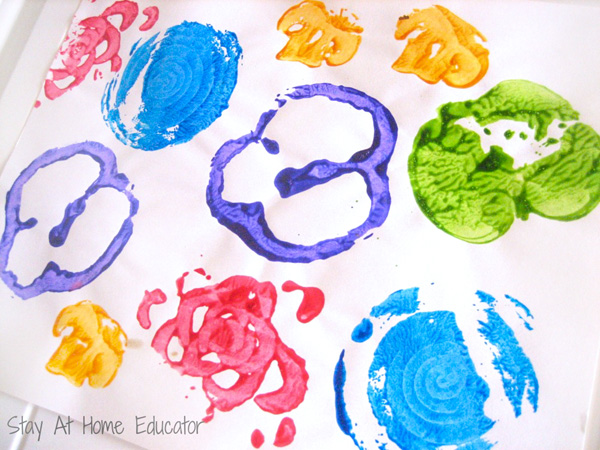
Painting With Celery Stalks
This activity came about unintentionally.
While cutting our celery stalk for the above activity, one student noticed how the inside stalks look like paint brushes. What a thoughtful and observant child!
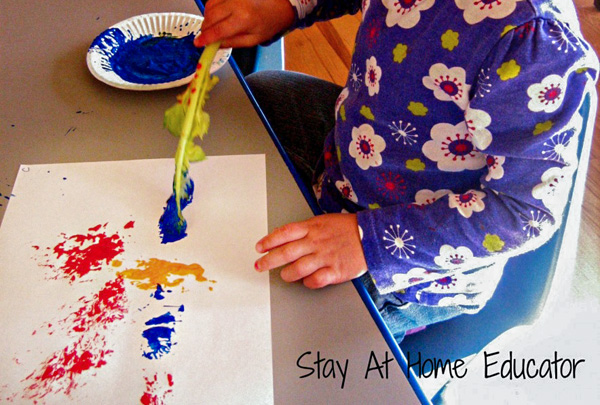
Healthy Vs. Unhealthy Food File Folder Game
This printable was a favorite among my preschoolers. As a teacher, I loved it because everything can be kept nicely in the file folder. Plus, it really helped the children learn the differences between healthy and non-healthy food choices.
Students roll the dice and move their game piece the corresponding number. If the player lands on a healthy food, they add a counter to their grid.
If the player lands on something unhealthy, they collect no counter and must wait until their next turn to try again.
The game continues until a player fills their entire grid of ten. Or, for a bigger challenge or for older preschoolers, I’ve also included a score card to twenty.
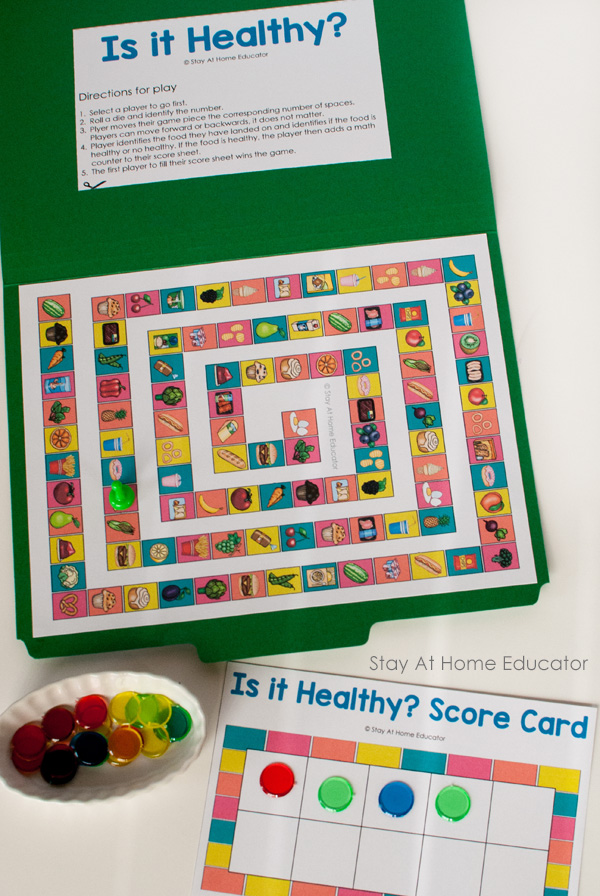
Get Your Healthy vs. Unhealthy File Folder Game Here
This game is included in our Food and Nutrition Activity Pack.
Healthy Vs. Unhealthy Food Sort
In this activity, we used grocery ads to categorize foods as ‘healthy’ or ‘sometimes’ foods. We were more forgiving with our preschoolers than usual.
For instance, we typically consider fruit juice as a ‘sometimes’ food at home, favoring whole fruits over the sugar-laden juice. However, as many parents view fruit juice as healthy, we classified it as such in our activity.
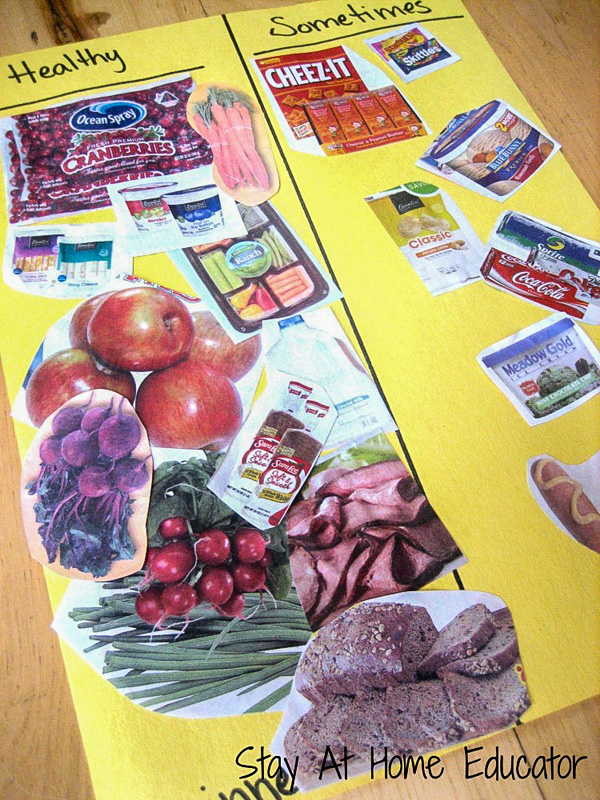
Smiley Face Fruit and Vegetable Sticker Stories (Dictated)
Dictated stories are great for budding writers. For an activity, I used fruit and vegetable stickers I had bought. Each student picked three stickers as their story characters.
Then, they enriched the scene with markers, and told me their tale, which I wrote down.
The following is a humorous story from my son. It involved a tornado, lightning, and vegetables escaping the storm in a car until they were safe. Quite a funny story from a funny kid!
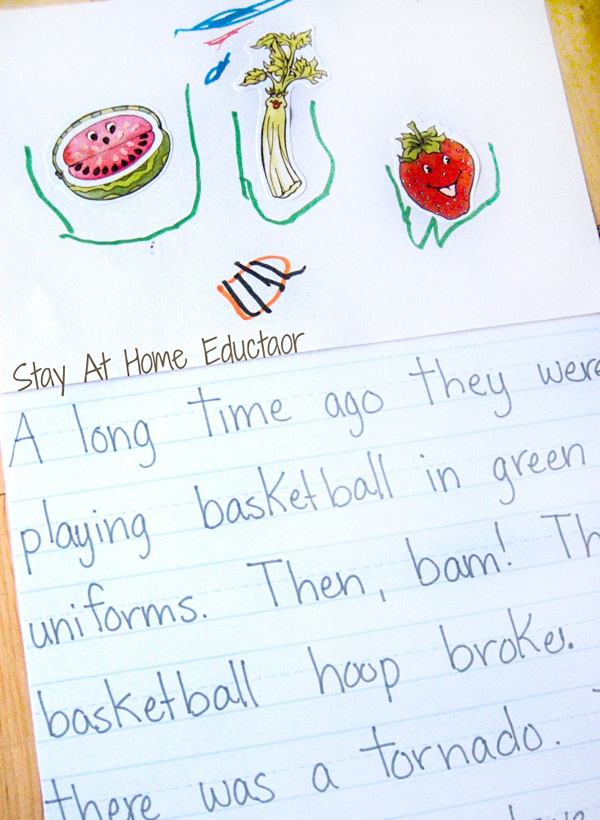
Printable Food & Nutrition Activities
These activities are just the start of a great unit, and one of my favorites to teach.

I’m Sarah, an educator turned stay-at-home-mama of five! I’m the owner and creator of Stay At Home Educator, a website about intentional teaching and purposeful learning in the early childhood years. I’ve taught a range of levels, from preschool to college and a little bit of everything in between. Right now my focus is teaching my children and running a preschool from my home. Credentials include: Bachelors in Art, Masters in Curriculum and Instruction.
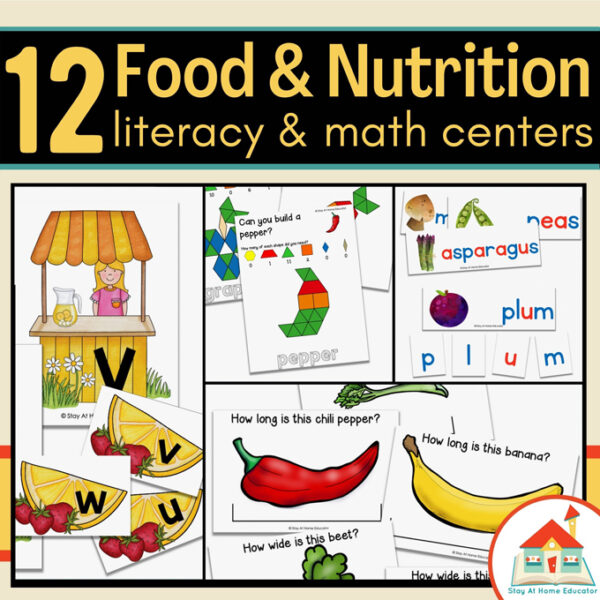







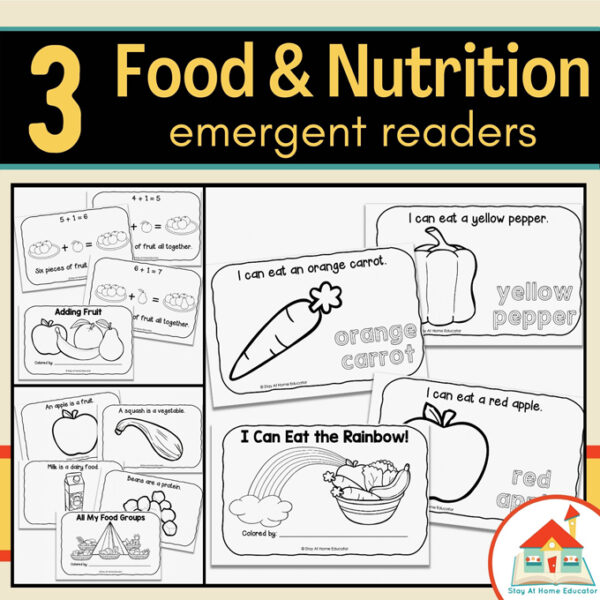
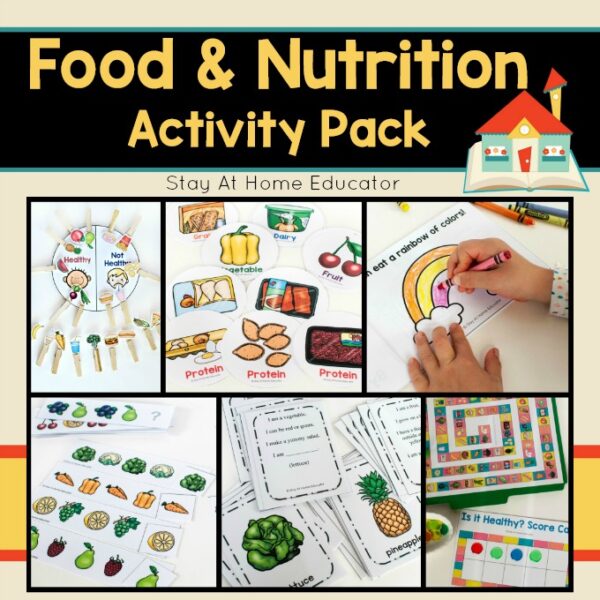

[…] Learn more: Stay at Home Educator […]